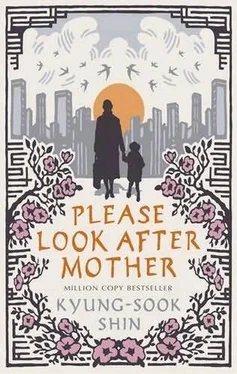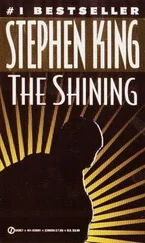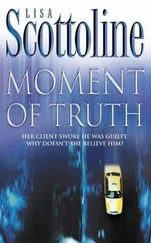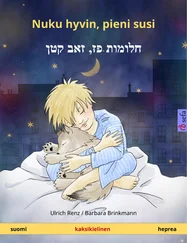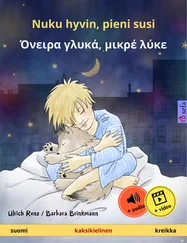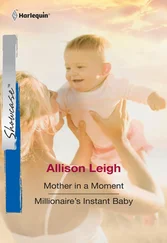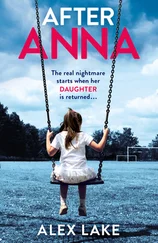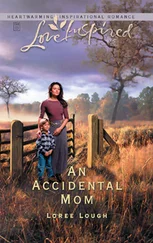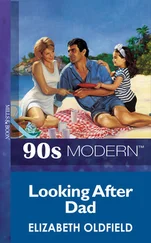This room, where I put the books Chi-hon sent down when she went to Japan, is cold, too. The books look frozen solid. After she sent the books here, this became my favorite room in the house. When I could tell that my head was going to hurt, I came in here and lay down. At first it seemed like I would get better. I didn’t want to tell you that I was in pain. Then, as soon as I opened my eyes, the pain rushed at me, and I couldn’t even cook for you, but I didn’t want you to see me as a patient. That made me lonely, many times. I would go into the room with the books and lie down. One day, holding my pounding head, I promised myself that I would read at least one book that she wrote before she came back from Japan. And I went to learn how to read, still holding my head. I couldn’t continue. When I tried to learn to read, my condition quickly got worse. I was lonely because I couldn’t tell you that I was trying to learn to read. It would have hurt my pride to say something like that. When I learned to read, I wanted to do one more thing, besides reading my daughter’s book with my own eyes: to write a farewell letter to every person in the family, before I became like this.
· · ·
The wind, it’s blowing so hard. The wind is rolling the snow in the yard and shifting it around.
Summer nights, when we set out the brazier and made steamed buns, were the best times we had in this yard. Hyong-chol would collect compost and make a fire to protect us from mosquitoes, and the younger ones would flop onto the platform and wait for the steamed buns to finish cooking in the pot on the brazier. When I made a whole pot of buns and set them out on a wicker tray, hands would shoot out, and the buns would all be gone. It took less time for the children to eat them than for me to steam them. As I put kindling in the brazier, I would look at the children lying on the platform together, waiting for another batch of buns, and it frightened me a little. How they could eat! Even though the fire was lit, the mosquitoes stuck incessantly to my arms and thighs and sucked my blood, and as the night became darker, the children ate all the buns and waited for more, while I kept steaming them. There were summer nights when, one by one, they fell asleep stretched over one another, waiting for the buns to cook. While they were sleeping, I would finish steaming the rest of the buns, put them in a basket, cover it, leave it on the platform, and go to sleep; the dawn dew slightly hardened the outside of the steamed buns. As soon as they woke up, the children would pull the basket toward them and eat some more. That’s why my children still like cold steamed buns, the outsides slightly hardened. There were summer nights like that. Summer nights with stars pouring down from the sky.
When I was wandering the streets, I couldn’t remember anything and my head was fuzzy, but I missed this place a lot. You don’t know how much I missed it here, this yard, under the porch, the flower garden, the well. After wandering a while, I sat down on a street and drew in the dirt what came to mind. And it was the house. I drew the gate, I drew the flower garden, I drew the ledge of clay jars, I drew the porch. I couldn’t remember anything except that house, the house that was here long before this house, that house that had disappeared a long time ago, that house with the traditional kitchen and the back yard shaded by butterbur leaves and the shed next to the pigsty. Those blue galvanized iron gates, their paint peeling. The gates of that house, with a smaller gate inset in the left one, and the mailbox to its right. There were only a few times that both gates needed to be opened, but the smaller inset gate, with a wooden handle, was always open to the alley. We never locked our doors. Even if we weren’t at home, the neighborhood children came in through the inset gate and played until the sun set. During the busy farming season, my young daughter would come home from school, climb on the bicycle on its stand under the persimmon tree in the yard emptied of people, and pedal. When I came home, she would be sitting on the edge of the porch and jump into my arms, shouting, “Mom!” When my second son ran away from home, I left food out for him in the warmest part of the room and kept both big doors of the gate wide open. When someone tripped over the rice bowl and caused it to spill, I righted it. If I woke up in the middle of the night because of the wind, I would go outside and prop the doors open with heavy rocks, in case the wind closed them. My eyes and ears were trained on the gate, every time it made a noise.
· · ·
The wardrobe is frozen solid, too.
The doors don’t even open. But it should be empty. When my head started to hurt so badly, I wanted to go to that man, whom I hadn’t seen in a long time. I thought maybe I would get better if I did. But I didn’t go. I pressed down my desire to go, and went through my things. I could feel that it was approaching, the day when I wouldn’t be able to recognize anything because I would be numb. I wanted to take care of all my things while I could still recognize them. I wrapped in a cloth the clothes I didn’t wear, which I’d hung in the wardrobe, unable to throw them out, and burned them in the fields. The underclothes that Hyong-chol bought me with his first paycheck had been in the wardrobe for decades, with the tags still on. When I was burning them, my head felt like it would split in half. I burned everything I could, except the blankets and pillows, which the children could use when they came home for the holidays. I burned the cotton blankets that my mother had made for me when I got married. I took out everything I’d spent a long time with and looked at it all again. The things I never used because I was saving them, the dishes I collected to give my elder daughter when she got married. If I’d known that she wasn’t going to get married, even though her younger sister is married and has three children, I would have given them to my younger daughter. I stupidly thought I had to give them to Chi-hon because I’d planned to give them to her. I hesitated, then took them outside and smashed them to pieces. I knew-one day I wouldn’t remember anything. And before that happened, I wanted to take care of everything I’d ever used. I didn’t want to leave anything behind. All the bottom cupboards are empty, too. I broke everything that was breakable and buried it all.
Even in that frozen wardrobe, the only winter clothing would be the black mink coat my younger daughter bought me. The year I turned fifty-five, I didn’t want to eat or go out. I spent my days buried deep in unpleasantness, feeling like my face was being torn off. When I opened my mouth, I thought I smelled something bad. At one point, I didn’t say a word for over ten days. I tried to shoo away negative thoughts, but every day a sad thought was added to my collection. Even though it was in the middle of winter, I kept dipping my hands in cold water and washing and washing them. And one day I went to church. I stopped in the churchyard. I bent over the feet of the Holy Mother, who was holding her dead son, to pray for her help to pull me out of this depression, which I couldn’t stand any longer, to beg her to take pity on me. But then I stopped myself, wondering what more I could ask of someone holding her dead son. During mass, I saw that the woman in front of me was wearing a black mink coat. Drawn by its softness, I quietly lowered my face to it, without even realizing I was doing it. The mink, like a spring breeze, gently embraced my old face. The tears I’d been holding back poured out. The woman moved away when I kept trying to rest my head on her mink coat. When I got home, I called my younger daughter and asked her to buy me a mink coat. It was the first time I’d opened my mouth in ten days.
Читать дальше
